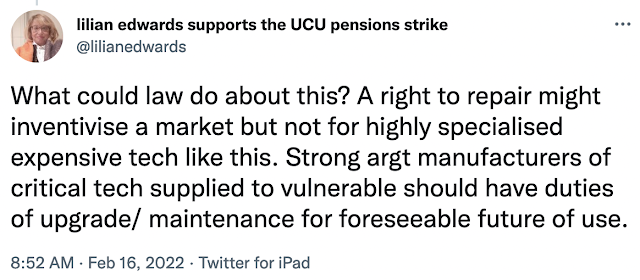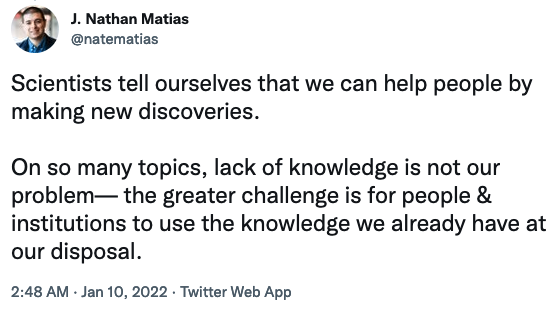Notes: a lot of bits and pieces, plus thinnovation
The 2022 edition of the Corporate Climate Responsibility Monitor came out from the New Climate Institute. It sheds light on the differences between well-publicised pledges of 'net zero' from 25 very large companies (which comprise maybe 5% of global emissions). Thanks to Chris Adams for sharing!
We found that the headline pledges of 25 of the world’s largest companies in reality only commit to reduce emissions by 40% on average, not 100% as suggested by the terms “net-zero” and “carbon neutral”.
... The signal sent by the reference to “zero” is a helpful concept, but the “net” can be problematic. Global emissions need to be reduced to net-zero, so companies need to think about how they can completely eliminate their greenhouse gas emissions. Here the concept of “zero” is helpful because it changes the mindset from “marginal reductions and optimisations here and there” to a “full transformation”. The “net” is not helpful if companies start creative accounting just to demonstrate a neutral balance.
Net-zero emissions is fundamentally a societal goal, not necessarily a goal that is appropriate to transpose onto every individual corporate entity. Not all sectors currently have the technological means to completely decarbonise by the middle of the century; achieving net-zero emissions at the global level will require carbon dioxide removals. But the potential of carbon dioxide removals is limited. Natural carbon sinks and carbon dioxide removal technologies must be used to neutralise residual emissions from hard to abate emission sources. If any company has the right to assume ownership of these sinks to neutralise their own unabated emissions, and they are no longer available to balance out residual emissions from hard to abate emission sources, then the achievement of net zero at the global level will simply not be technically possible.
... the available land for nature-based carbon removals is scarce: there will not be enough land available on the planet to provide an offsetting service to all countries, companies and individuals planning to claim carbon neutrality in the future. On a pathway to global net-zero emissions by mid-century, we will need scarce natural resources for carbon removals to balance out the residual emissions that remain from the hardest to abate sectors, once the emissions from other sectors have been reduced to real-zero. Scarce carbon sinks must be considered a public good..Over in the Liminal community, a useful new term:
Some people use innovation and disruption almost interchangeably - if disruptive, therefore innovative. If innovative, therefore disruptive.
It just ain't so.
We could go further, and say that we live in a time of thinnovation: stuff with the superficial shiny sheen of technological progress (20 years of 'thin' comms technology built on designs from 60 years previous, and painfully slow, near-stagnation in Big Stuff (say) nuclear or genetic technologies...which we have been taught to fear). No new classes of antibiotic... but Facebook. Etc.
Does the world of 'crypto' also bring new ways of thinking about funding public goods? My to-read list about web3 and the commons needs processing, but in the meantime Nadia Eghbal writes about science funding (creating public goods in the form of new knowledge), and the traditional vs 'crypto' ways of doing this. I'm linking to the summary because there's a lot here! I remain skeptical of some of the 'crypto' stuff here but the ideas of changing funding and project dynamics are really interesting.
There are fundamental differences in the crypto- vs. tech-native theories of change. Tech focuses on hiring top talent, but borrows similar reward structures from both science and startups today. Crypto takes a more diffuse, networked approach to attracting talent and is more willing to reimagine basic structures like patents, IP, and even research labs themselves.
... Vitalik Buterin also gave a talk at Funding the Commons that echoed these sentiments. He explains that blockchain communities are built more on public goods than private goods, such as open source code, protocol research, documentation, and community building. He therefore emphasizes that “Public goods funding needs to be long-term and systematic,” meaning that funding needs to come “not just from individuals, but from applications and/or protocols.”
Ben Thompson talks tech and war - about the difference between capabilities and intentions, and how this plays out in public (government decisions) or private sanctions (corporates pulling out of Russia). A long read, going into what this all means for semiconductors.
A scary report in the Prepared newsletter, about how fragile biochemical production is:
In 1998, the HIV antiretroviral Ritonavir temporarily disappeared from the market. The culprit was what Derek Lowe calls “perverse polymorphism,” a phenomenon where the crystalline form of a particular molecule gets “infected” by a more energetically favorable one, which in extreme cases can make the original form impossible to manufacture. It’s thought to be caused by microscopic seed crystals of the new form permeating the air of the manufacturing environment. The issue was serious enough that the company was forced to hold press conferences, and some of the transcripts are really something:This is why all of us at Abbott have been working extremely hard throughout the summer [of 1998], often around the clock, and sometimes never going home at night. We have been here seven days a week and we will continue to do so. We have canceled vacations and asked our families for their understanding and support. This is not an issue that we take lightly…
There were several sub-teams of three to 600 people per team working full time in different areas. We also called on as many resources as we could…
We tried everything. We conducted countless experiments. We reconditioned our facilities. We rebuilt facilities and new lines. We looked at alternative sites. We visited a number of [other] organizations around the world…︁to see if we could start clean in a new environment free of Form II…
In a matter of weeks—maybe five or six weeks, every place the product was became contaminated with Form II crystals.
The problem was eventually solved - after costing Abbott almost $250 million - by way of a soft gelatin capsule, which could effectively deliver the new form of the drug.
Alex Deschamps-Sonsino has written up what the world of exporting goods from Britain to Europe looks like now. It's complicated.
Retinal implants becoming obsolete and no longer supported - a feature from IEEE Spectrum about a company that produced powerful and novel implant tech. As one might expect it worked with variable success, but patients were told their devices would be supported - except this faded away even before the company collapsed, leaving health risks and loss of sight. What could be done to prevent this sort of thing?
 |
| https://twitter.com/lilianedwards/status/1493870846250831872 |
But as Lilian points out in that thread, the NHS wouldn't be paying $150k a pop for this sort of thing anyway.
Indeed, the NHS is not doing so great, as this thread of graphs by Dan Goyal, from mid February, shows.
 |
| https://twitter.com/natematias/status/1480370816642658304 |
Nathan is referring to a prescient 2009 paper on pandemic response and psychology.
Debora MacKenzie writes about pandemic narratives, and the key things that need to shift (in the UK at least) before the next one. Christina Pagel has a nice thread on what we should learn and do.
Maersk is releasing its huge dataset about weather into the public domain. Yay! (via Infrastructure Club)
I do hope the Online Safety Bill in the UK ends up somewhere sensible. There's too much to keep track of but this sums it up nicely:
 |
| https://twitter.com/RobertJBateman/status/1497239457166237717 |
The deadline to register "forgotten" paths in the UK is being scrapped.
James Plunkett notes (twitter thread) that we don't talk enough about opportunity cost - because we are focussed on short term crises, and yet many economic/social things are changing fast and arguably need more agile development of law, institutions etc.
I don't know if paying folks more is the answer, but clearly something needs to change:
 |
| https://twitter.com/HetanShah/status/1492892929417003013 |
Do dividends "pay our pensions" in the UK? Mostly, not really, any more - as shown in this graph. The rest of the thread is interesting too and there's a TUC report.
Might tithes be a good way to fund open source infrastructure?
Machine learning is still in a hype cycle:
 |
| https://twitter.com/ChristophMolnar/status/1483356147168034818 |
 |
| https://twitter.com/daniel_d_kang/status/1485674701452034048 |
What do you know about where you live? A list of challenging questions. HT Anna and Kelly Pendergrast in the Prepared.
It's been a weird couple of months and so I was particularly selective, or random, in picking out things to include. A lot of fascinating stuff ended up on the digital cutting room floor. Hey ho.